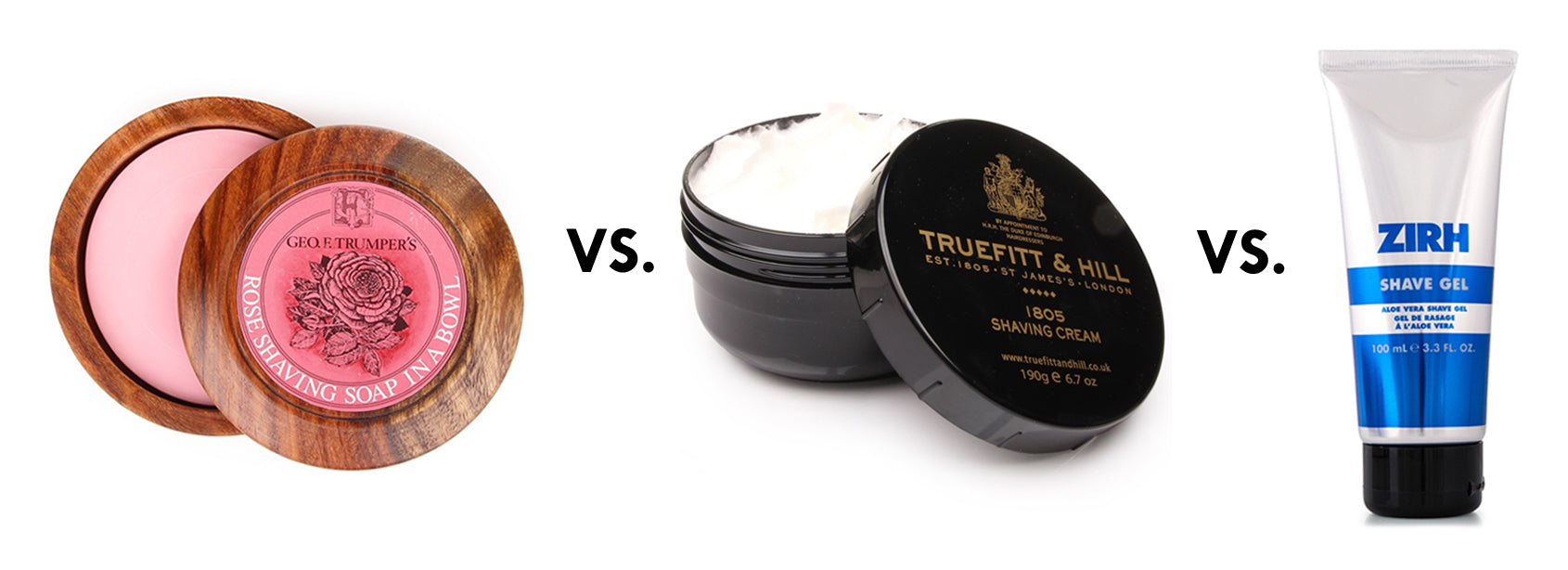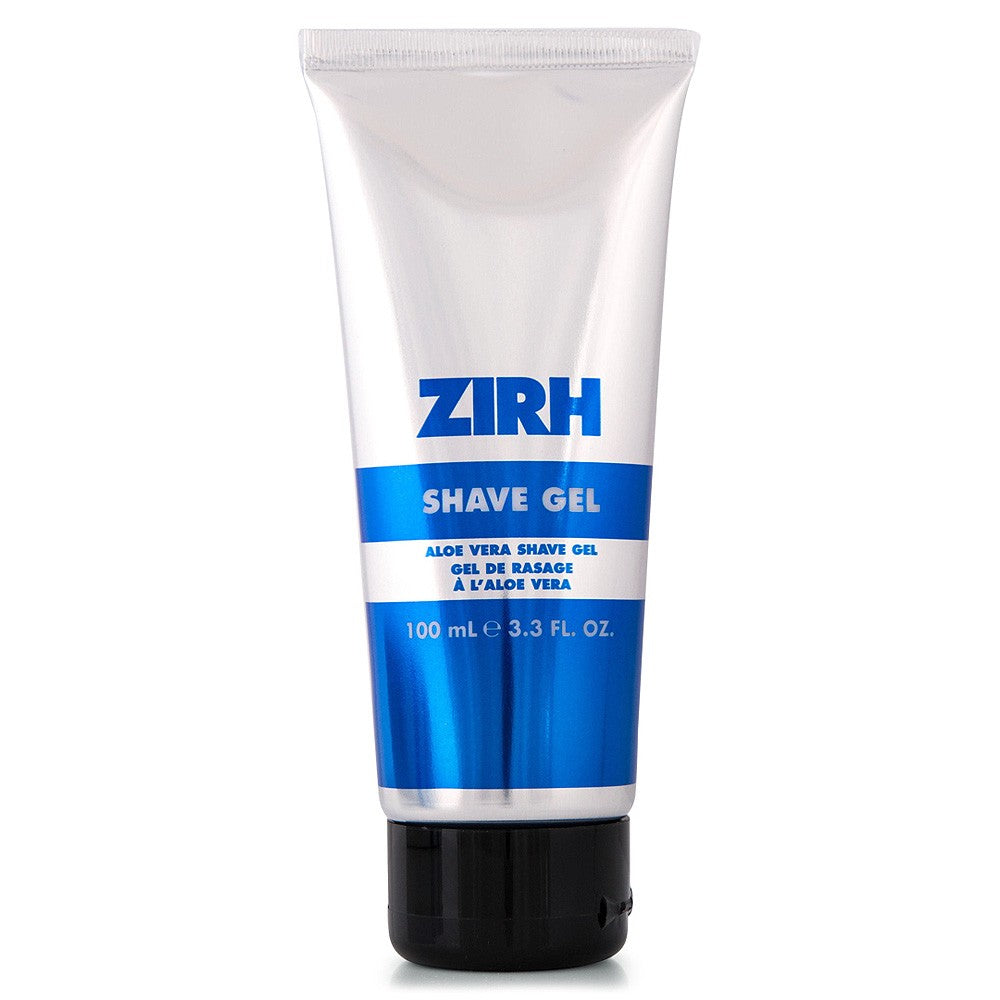
Proper razor technique and blade sharpness are only part of the wet shaving puzzle. To shave well, you must ultimately be equipped with a spread of tools tailored to your skin type and lifestyle.
Shaving creams, shaving soaps, and shaving gels are all designed for the same purpose: to enhance glide and protect your face during shaving. But each type has benefits and drawbacks.
We hope the following breakdown will help you decide which one to go with!
Shaving Soap

There’s a small learning curve associated with lathering a shaving soap. Condensed into a puck or a disc, shaving soaps only lather with water and a shaving brush. Producing lather takes a few minutes, and the process can be even harder if you’re using triple-milled soap.
Triple-milled soap is soap that has been passed through a milling machine three times to thoroughly mix the ingredients and fragrances, as well as squeeze out extra moisture. This makes triple-milled soap harder than regular soap – and thus more difficult to lather. However, once you do learn how to lather it, triple-milled soap produces the richest lather you will experience. Plus, triple-milled soap is more economical. You can easily get 3 – 4 months of shaving out of one puck.
This is why soaps like
Mitchell’s Wool Fat Shaving Soap and
Geo F. Trumper Hard Shaving Soap (both triple-milled soaps) have just as many die-hard fans as men who complain about how hard they are to lather. A trick to try: place a few drops of
Geo F. Trumper Skin Food or glycerin on the puck or brush prior to lathering. Most importantly,
always use distilled water.
If you want more advice on the subject, we actually wrote a blog post on
how to get lather from Geo F. Trumper Hard Shaving Soap here.For a slightly easier lathering experience, try
Edwin Jagger Shaving Soap.
Tip: If you have sensitive skin, note that shaving soaps are more likely to dry out your skin than creams or gels. But don’t let that stop you from trying one – just pick a soap formulated for sensitive skin, like
Acca Kappa Muschio Bianco Shaving Soap Bowl.
--
Shaving Cream

Shaving creams contain more water than shaving soaps. This makes them far easier to lather (in fact, you can lather immediately and without water, versus having to build lather slowly with shaving soaps). So if you typically find yourself short on time, a shaving cream may be the smart choice for you. We also recommend shaving soaps for those new to wet shaving, as developing lather with soap is a learning process in and of itself.
And shaving creams are often a better choice for men with sensitive skin. Because shaving creams tend to come in many more varieties than shaving soaps, you’ll find plenty of unscented versions with minimal ingredients that can irritate skin. Truefitt & Hill has a lovely unscented line called
Ultimate Comfort, formulated for sensitive skin.
You can’t go wrong with a shaving cream from one of the three T’s: Geo F. Trumper, Taylor of Old Bond Street, and Truefitt & Hill. For an indulgent shave experience, try
Castle Forbes Essential Oil Shaving Cream, an ultra rich cream with aloe vera to prevent irritation. If you’re looking for something more affordable,
Proraso has long been a standby.
--
Shave Gel

Like shaving creams, shaving gels don’t require water to build lather. Just squeeze some out from the tube and apply with your fingers. Shaving gels are thinner in consistency than shaving creams and allow you to see what you’re doing, since they don’t produce lather. This feature makes shaving gels a good choice for beginners who can use the visual feedback.
Zirh Aloe Vera Shaving Gel is a lightweight-yet-hydrating shaving gel that cushions with glycerin and has a smooth consistency.
The Conclusion
So which type of shaving product should you use? Let’s sum it up:
For massive lather: Shaving Soap
For men with limited time: Shaving cream or gel
For beginners: Shaving cream or gel
For men with dry or sensitive skin: Shaving cream

 Proper razor technique and blade sharpness are only part of the wet shaving puzzle. To shave well, you must ultimately be equipped with a spread of tools tailored to your skin type and lifestyle.
Shaving creams, shaving soaps, and shaving gels are all designed for the same purpose: to enhance glide and protect your face during shaving. But each type has benefits and drawbacks.
We hope the following breakdown will help you decide which one to go with!
Proper razor technique and blade sharpness are only part of the wet shaving puzzle. To shave well, you must ultimately be equipped with a spread of tools tailored to your skin type and lifestyle.
Shaving creams, shaving soaps, and shaving gels are all designed for the same purpose: to enhance glide and protect your face during shaving. But each type has benefits and drawbacks.
We hope the following breakdown will help you decide which one to go with!
 There’s a small learning curve associated with lathering a shaving soap. Condensed into a puck or a disc, shaving soaps only lather with water and a shaving brush. Producing lather takes a few minutes, and the process can be even harder if you’re using triple-milled soap.
Triple-milled soap is soap that has been passed through a milling machine three times to thoroughly mix the ingredients and fragrances, as well as squeeze out extra moisture. This makes triple-milled soap harder than regular soap – and thus more difficult to lather. However, once you do learn how to lather it, triple-milled soap produces the richest lather you will experience. Plus, triple-milled soap is more economical. You can easily get 3 – 4 months of shaving out of one puck.
This is why soaps like Mitchell’s Wool Fat Shaving Soap and Geo F. Trumper Hard Shaving Soap (both triple-milled soaps) have just as many die-hard fans as men who complain about how hard they are to lather. A trick to try: place a few drops of Geo F. Trumper Skin Food or glycerin on the puck or brush prior to lathering. Most importantly, always use distilled water.
If you want more advice on the subject, we actually wrote a blog post on how to get lather from Geo F. Trumper Hard Shaving Soap here.For a slightly easier lathering experience, try Edwin Jagger Shaving Soap.
Tip: If you have sensitive skin, note that shaving soaps are more likely to dry out your skin than creams or gels. But don’t let that stop you from trying one – just pick a soap formulated for sensitive skin, like Acca Kappa Muschio Bianco Shaving Soap Bowl.
--
There’s a small learning curve associated with lathering a shaving soap. Condensed into a puck or a disc, shaving soaps only lather with water and a shaving brush. Producing lather takes a few minutes, and the process can be even harder if you’re using triple-milled soap.
Triple-milled soap is soap that has been passed through a milling machine three times to thoroughly mix the ingredients and fragrances, as well as squeeze out extra moisture. This makes triple-milled soap harder than regular soap – and thus more difficult to lather. However, once you do learn how to lather it, triple-milled soap produces the richest lather you will experience. Plus, triple-milled soap is more economical. You can easily get 3 – 4 months of shaving out of one puck.
This is why soaps like Mitchell’s Wool Fat Shaving Soap and Geo F. Trumper Hard Shaving Soap (both triple-milled soaps) have just as many die-hard fans as men who complain about how hard they are to lather. A trick to try: place a few drops of Geo F. Trumper Skin Food or glycerin on the puck or brush prior to lathering. Most importantly, always use distilled water.
If you want more advice on the subject, we actually wrote a blog post on how to get lather from Geo F. Trumper Hard Shaving Soap here.For a slightly easier lathering experience, try Edwin Jagger Shaving Soap.
Tip: If you have sensitive skin, note that shaving soaps are more likely to dry out your skin than creams or gels. But don’t let that stop you from trying one – just pick a soap formulated for sensitive skin, like Acca Kappa Muschio Bianco Shaving Soap Bowl.
--
 Shaving creams contain more water than shaving soaps. This makes them far easier to lather (in fact, you can lather immediately and without water, versus having to build lather slowly with shaving soaps). So if you typically find yourself short on time, a shaving cream may be the smart choice for you. We also recommend shaving soaps for those new to wet shaving, as developing lather with soap is a learning process in and of itself.
And shaving creams are often a better choice for men with sensitive skin. Because shaving creams tend to come in many more varieties than shaving soaps, you’ll find plenty of unscented versions with minimal ingredients that can irritate skin. Truefitt & Hill has a lovely unscented line called Ultimate Comfort, formulated for sensitive skin.
You can’t go wrong with a shaving cream from one of the three T’s: Geo F. Trumper, Taylor of Old Bond Street, and Truefitt & Hill. For an indulgent shave experience, try Castle Forbes Essential Oil Shaving Cream, an ultra rich cream with aloe vera to prevent irritation. If you’re looking for something more affordable, Proraso has long been a standby.
--
Shaving creams contain more water than shaving soaps. This makes them far easier to lather (in fact, you can lather immediately and without water, versus having to build lather slowly with shaving soaps). So if you typically find yourself short on time, a shaving cream may be the smart choice for you. We also recommend shaving soaps for those new to wet shaving, as developing lather with soap is a learning process in and of itself.
And shaving creams are often a better choice for men with sensitive skin. Because shaving creams tend to come in many more varieties than shaving soaps, you’ll find plenty of unscented versions with minimal ingredients that can irritate skin. Truefitt & Hill has a lovely unscented line called Ultimate Comfort, formulated for sensitive skin.
You can’t go wrong with a shaving cream from one of the three T’s: Geo F. Trumper, Taylor of Old Bond Street, and Truefitt & Hill. For an indulgent shave experience, try Castle Forbes Essential Oil Shaving Cream, an ultra rich cream with aloe vera to prevent irritation. If you’re looking for something more affordable, Proraso has long been a standby.
--
 Like shaving creams, shaving gels don’t require water to build lather. Just squeeze some out from the tube and apply with your fingers. Shaving gels are thinner in consistency than shaving creams and allow you to see what you’re doing, since they don’t produce lather. This feature makes shaving gels a good choice for beginners who can use the visual feedback.
Zirh Aloe Vera Shaving Gel is a lightweight-yet-hydrating shaving gel that cushions with glycerin and has a smooth consistency.
Like shaving creams, shaving gels don’t require water to build lather. Just squeeze some out from the tube and apply with your fingers. Shaving gels are thinner in consistency than shaving creams and allow you to see what you’re doing, since they don’t produce lather. This feature makes shaving gels a good choice for beginners who can use the visual feedback.
Zirh Aloe Vera Shaving Gel is a lightweight-yet-hydrating shaving gel that cushions with glycerin and has a smooth consistency.




